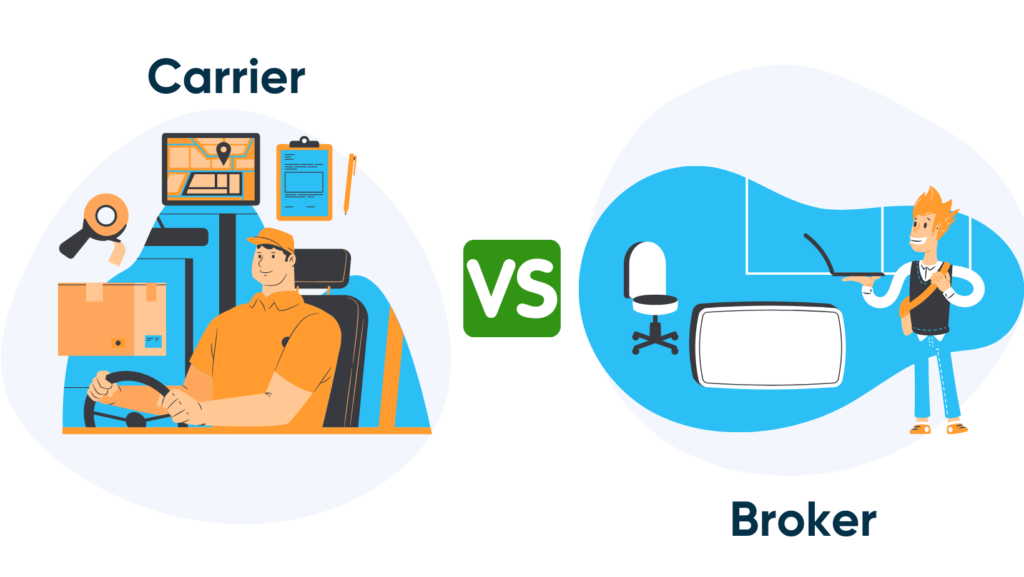You’ve just bought your dream car from across the country, landed a new job that requires a big move, or perhaps you’re a snowbird heading south for the winter. Excitement is high, but then the logistics set in: How do you get your beloved vehicle from point A to point B safely and efficiently?
When it comes to shipping a car, you’ll quickly encounter two main options: working directly with a car shipping carrier or enlisting the help of an auto transport broker. At first glance, they might seem similar, but understanding the fundamental difference between carrier and broker services is crucial for a smooth and stress-free experience. This article will break down what each option entails, weigh their pros and cons, and help you decide which path is right for your unique car shipping needs.

What Is a Car Shipping Carrier?
A car shipping carrier is the company that directly transports your vehicle. They own and operate the trucks, trailers, and other equipment necessary to move cars. Think of them as the drivers and the hands-on service providers in the auto transport industry.
How They Operate:
- Carriers have their own fleet of trucks (open or enclosed) and a team of drivers.
- They handle the physical loading, transport, and unloading of vehicles.
- Their operations are typically focused on specific routes or regions where their trucks are dispatched.
Pros of Using a Carrier Directly:
- Direct Communication: When you work directly with a carrier, you’re speaking with the company that’s physically moving your car. This can sometimes lead to more direct updates.
- Potential for Lower Cost (in specific scenarios): If you find a carrier with an empty spot on a truck already traveling your exact route, you might snag a slightly lower price by cutting out an intermediary.
- Knowledge of Their Own Equipment: They have intimate knowledge of their vehicles and capabilities.
Cons of Using a Carrier Directly:
No Vetting Process: When you contact a carrier directly, you’re responsible for doing all the due diligence to ensure they are reputable, licensed, and insured.
Limited Routes and Availability: Carriers operate on fixed routes. If your desired pickup or delivery location doesn’t align with their current schedule or service area, you might face long waits or be out of luck entirely. Imagine trying to find a carrier with a truck going from Boise, Idaho, to Tallahassee, Florida, on precisely the day you need it. It’s like finding a needle in a haystack.
Less Flexibility: Their schedules are rigid. If you need a specific pickup window or have a last-minute change, a carrier might not be able to accommodate you.
No Dedicated Customer Service Team: Many smaller carriers are focused on logistics and driving, not on providing extensive customer support or managing multiple inquiries simultaneously. You might find it harder to get quick answers to your questions.
Limited Insurance Information: While carriers are required to carry insurance, verifying their coverage and understanding its specifics can be more challenging for an individual.
What Is a Car Shipping Carrier?
An auto transport broker acts as an intermediary between you (the customer) and the car shipping carrier. They don’t own trucks or transport vehicles themselves. Instead, they specialize in connecting customers with a network of licensed and insured carriers that can meet their specific shipping needs.
How They Work:
- Network Access: Brokers have relationships with hundreds, if not thousands, of carriers across the country. They leverage this network to find the best fit for your shipment.
- Finding the Right Match: When you provide your shipping details, a broker will post your vehicle on a central dispatch board, where carriers bid on the job. The broker then selects the best carrier based on factors like price, availability, and their vetting criteria.
- Vetting and Verification: Reputable brokers pre-screen carriers to ensure they are properly licensed by the USDOT (U.S. Department of Transportation), have up-to-date federal licensing, and carry adequate insurance coverage. They verify the carrier’s operating authority and safety record.
- Customer Support and Coordination: Brokers handle the entire coordination process, from finding a carrier and scheduling pickup to providing updates and addressing any issues that arise during transit.
Pros of Using an Auto Transport Broker:
- Wide Network and Better Availability: Because brokers work with numerous carriers, they can almost always find a carrier for your route, even for less common destinations or urgent shipments. This drastically increases your chances of finding a truck when you need it.
- Competitive Pricing: By posting your shipment to a broad network of carriers, brokers can leverage competition among them to get you the most competitive price. Imagine trying to call 20 different carriers yourself to compare quotes; a broker does this efficiently on your behalf.
- Enhanced Customer Support: Leading auto transport platforms typically have dedicated customer service teams to assist you throughout the shipping process, answer questions, and resolve concerns.
- Vetted and Insured Carriers: This is a major advantage. Reputable brokers only work with carriers that meet strict licensing and insurance requirements, significantly reducing your risk of dealing with an unreliable or uninsured company. They act as a safeguard against scams and ensure your vehicle is protected.
- Flexibility and Customization: Brokers can often accommodate specific requests, such as enclosed transport, expedited shipping, or particular pickup/delivery windows, by finding a carrier that specializes in those services.
- Problem Resolution: If an issue arises during transport, the broker acts as your advocate, helping to resolve disputes with the carrier and ensuring your satisfaction.
- Transparency: Platforms often provide transparent information about carriers, including their ratings and reviews, helping you make an informed decision.
Cons of Using an Auto Transport Broker:
- Not Direct with the Driver: While you communicate with the broker, you won’t always have direct contact with the specific driver transporting your vehicle.
- Brokerage Fee: Brokers charge a fee for their services, which is typically included in the total quote. However, the value of their services often outweighs this fee, especially considering the time and effort they save you.
Comparison Table: Broker vs. Carrier
To help you visualize the key differences, here’s a comparison table:
| Feature | Car Shipping Carrier | Auto Transport Broker |
| Direct Service | Yes, they physically transport the vehicle. | No, they arrange transport through their carrier network. |
| Equipment | Owns and operates trucks and trailers. | Does not own equipment. |
| Network | Limited to their own fleet and routes. | Extensive network of hundreds/thousands of carriers. |
| Pricing | Direct quote from their specific services. | Access to competitive bids from multiple carriers, often leading to better pricing. |
| Flexibility | Limited, dependent on their existing routes and schedule. | High, can find carriers to match various routes and timelines. |
| Communication | Direct with the carrier company. | Direct with the broker; broker communicates with the carrier. |
| Vetting | You are responsible for vetting them. | Brokers pre-vet carriers for licensing, insurance, and reputation. |
| Customer Support | Varies; often less dedicated support. | Typically offers dedicated customer service teams. |
| Insurance | Required to carry their own insurance. | Verifies carrier’s insurance and can assist with claims. |
| Problem Resolution | Direct with the carrier, potentially challenging. | Broker acts as an advocate and assists with resolution. |
When Should You Choose a Broker?
Opting for an auto transport broker, especially through a reputable platform, is often the most advantageous choice for most individuals shipping a car. Here’s when choosing a broker is particularly beneficial:
- For Quick Matching with a Carrier: If you need to ship your car relatively soon and want to avoid the hassle of contacting multiple carriers, a broker can quickly find an available and suitable transport provider.
- For Unusual Routes or Urgent Shipments: If your pickup or delivery location is off the beaten path, or you have a tight deadline, a broker’s vast network significantly increases your chances of finding a carrier who can accommodate your needs.
- If You Want More Transparency and Support: If you value clear communication, detailed updates, and a dedicated team to answer your questions and assist with any issues, a broker is the ideal choice. They provide peace of mind by handling the logistics.
- To Ensure Carrier Reliability and Safety: If you’re concerned about scams, hidden fees, or ensuring your vehicle is handled by a properly licensed and insured company, a broker’s vetting process is invaluable. They take the guesswork out of finding a trustworthy partner.
- For Comparing Options Easily: A broker allows you to compare different carrier options and prices without having to do all the legwork yourself.
When Might a Carrier Be the Better Option?
While brokers offer significant advantages, there are niche scenarios where working directly with a carrier might be considered:
- If You Already Have a Trusted Contact: If you’ve used a specific carrier before for a particular route and had an excellent experience, and they can accommodate your current needs, you might stick with them.
- For Routine, Local Shipments with Fewer Requirements: For very short-distance, local moves where you’re familiar with the carrier and their service, a direct relationship might be simpler. However, even in these cases, the convenience and vetting offered by a broker can still be appealing.
- If You Prefer Direct Control Over Every Detail (and have time to manage it): If you have extensive experience in logistics and prefer to handle every aspect of the shipping process yourself, including vetting, scheduling, and problem-solving, you might choose to work directly with a carrier. This is a rare scenario for most consumers.
What to Look for in a Reliable Transport Partner
Whether you lean towards a broker or a direct carrier in a specific instance, discerning a trustworthy partner is paramount. Here’s a checklist of what to look for:
- Licensing and Registration: Ensure they are properly licensed by the Federal Motor Carrier Safety Administration (FMCSA) and have a valid USDOT number. This indicates they are authorized to operate.
- Insurance Coverage: Confirm they carry adequate cargo insurance to cover any potential damage to your vehicle during transit. Reputable partners will provide proof of insurance.
- Customer Reviews and Reputation: Check independent review sites (like the Better Business Bureau, Google Reviews, or Trustpilot) to see what other customers say about their experiences. Look for consistent positive feedback and how they handle complaints.
- Transparency: A reliable partner will be upfront about pricing, timelines, and their process. Avoid companies with hidden fees or vague explanations.
- Clear Communication: They should be responsive to your inquiries and keep you informed throughout the shipping process.
Leading auto transport platforms make this process significantly easier and safer. They pre-vet their network of brokers and carriers, ensuring all partners meet stringent requirements for licensing, insurance, and service quality. This means you don’t have to spend hours researching each potential transporter yourself; the platform has already done the heavy lifting for you.
How to Make the Final Decision
Ultimately, the choice between a carrier and a broker depends on your priorities: convenience, flexibility, support, or direct control.
- If you prioritize ease, peace of mind, competitive pricing, and access to a wide range of reliable options, a broker is almost always the superior choice. They simplify the complex process of finding and vetting a carrier, providing you with a safer and more efficient shipping experience.
- If you have a very specific, niche requirement that you’ve already found a direct carrier to fulfill, and you’re comfortable with managing all aspects yourself, then a direct carrier might be an option. However, for the vast majority of individuals shipping a car, the benefits of using a broker far outweigh any perceived advantages of going direct.
For a streamlined, secure, and stress-free car shipping experience, we recommend leveraging platforms that offer both options, primarily connecting you with a network of trusted brokers who, in turn, work with reliable carriers. This approach gives you the best of both worlds: the broad reach and support of a broker combined with the ultimate service provided by vetted carriers.
FAQ
Is it cheaper to use a carrier directly?
Not always. While you might avoid paying a broker’s fee, working directly with a carrier often limits your options. Carriers typically operate on fixed routes and may not offer the best rates or flexible pickup times. Brokers, on the other hand, have access to a large pool of carriers and can negotiate better pricing by creating competition among them—especially helpful if your route isn’t common or your timeline is tight.
Do brokers handle the insurance for my car?
Brokers themselves don’t provide vehicle insurance, but reputable ones work only with fully insured and licensed carriers. They verify each carrier’s cargo insurance and help you understand what coverage applies to your shipment. If a claim needs to be filed due to damage or delay, brokers often assist in navigating the process—acting as an intermediary to ensure you’re treated fairly and the issue is resolved promptly.
How do I know if a broker is legitimate?
A legitimate broker should be registered with the FMCSA (Federal Motor Carrier Safety Administration) and have a valid USDOT number. You can verify this via the FMCSA’s public database. Also, check the broker’s reviews across trusted third-party sites like BBB or TransportReviews. Using a platform like Compare The Carrier helps you avoid vetting entirely, as it only connects you with pre-approved and verified brokers.
Can I track my car when using a broker?
Yes, most professional brokers offer vehicle tracking services either through their platform or by providing real-time updates from the carrier. Some even use integrated GPS tracking systems for more accurate updates. Having a broker also means you have a single point of contact who can keep you informed throughout the shipment, reducing the stress and guesswork often associated with direct carrier communication.
What if something goes wrong during shipping?
If your shipment is delayed, damaged, or any issue arises, a broker acts as your advocate. They mediate with the carrier, help document the problem, and guide you through filing a claim if needed. Unlike dealing with a carrier directly—where resolution may be slow or unclear—a broker has a vested interest in keeping clients happy and will work to resolve disputes quickly, efficiently, and professionally.
How far in advance should I book my car shipment?
For best results, you should book 2–4 weeks before your preferred pickup date. This allows more time to match with a carrier that fits your schedule and budget. During peak seasons—such as summer moves or year-end relocations—early booking ensures better availability. Still, brokers can often accommodate urgent requests within days, thanks to their extensive network of ready-to-dispatch carriers.
Do brokers only work with specific types of vehicles?
No. One of the biggest advantages of using a broker is versatility. They can arrange transport for a wide variety of vehicles—sedans, SUVs, motorcycles, classic cars, luxury vehicles, RVs, and more. Based on your needs, brokers match you with specialized carriers who have the right equipment, such as enclosed trailers for high-value cars or winch-equipped trucks for inoperable vehicles.
What’s the difference between open and enclosed auto transport?
Open transport is the most common and affordable method—your vehicle is shipped on an open trailer, exposed to weather and road debris. Enclosed transport uses fully covered trailers that protect your car from the elements. It’s more expensive but ideal for shipping luxury, vintage, or exotic cars. Brokers help you decide which option fits your needs, balancing budget with protection.
Are there hidden fees when using a broker?
Transparent brokers include all fees—transport cost, service charges, insurance coverage—in the initial quote. Reputable platforms require brokers to provide full pricing upfront. Always ask for a detailed breakdown so you know exactly what you’re paying for. Beware of unusually low quotes, as they may hide fuel surcharges, delivery fees, or cancellation penalties not disclosed initially.
Can I choose my carrier when working with a broker?
While brokers typically select the best-matched carrier for your shipment, some platforms allow you to review carrier profiles and ratings before confirmation. You can also share preferences with your broker—such as favoring enclosed transport or avoiding certain companies—and they’ll do their best to accommodate. This approach combines choice with convenience and added quality control.
What documents do I need to ship my car?
Most auto transport doesn’t require a lot of paperwork. You’ll generally need the vehicle’s registration and proof of insurance. Upon pickup and delivery, the driver completes a Bill of Lading and inspection report that notes the car’s condition. You should keep copies of these documents for your records in case of a damage claim or if verification is needed by your insurance provider.
How long does car shipping usually take?
Transit time varies. For cross-country shipments, expect 7–14 days. Shorter routes may take 1–5 days. The timeline depends on distance, weather, traffic, and carrier availability. A broker can estimate delivery time more precisely by factoring in current demand, route popularity, and carrier schedules—offering you realistic expectations rather than vague promises.
What preparation does my car need before shipping?
Clean your car inside and out so the driver can perform a proper inspection. Remove personal items (some carriers allow limited contents—check first). Disable alarms, fold mirrors, and secure loose parts like spoilers or antennas. Keep the fuel tank around a quarter full. Proper prep ensures faster pickup, protects your car during transport, and avoids delays or extra fees.
What if my car is inoperable?
If your vehicle doesn’t run, transport is still possible but requires special equipment like a winch. This service usually costs more than standard shipping. Make sure to inform your broker upfront, so they can find a carrier equipped to handle inoperable vehicles. Failing to disclose this may result in delays or cancellation if the driver shows up unprepared.
Why should I compare car shipping brokers and carriers through a platform?
Using a trusted platform saves you time and stress. Instead of calling dozens of companies, you get curated options from verified brokers and carriers. You’ll see transparent pricing, carrier reviews, and built-in support. Platforms ensure you’re working with licensed, insured professionals and provide a single hub to manage everything—quotes, booking, and communication.



![Most Popular Methods Of Cross Country Car Shipping [2026 Update] 5 5 cross country auto transport](https://comparethecarrier.com/wp-content/uploads/2022/03/Most-Popular-Methods-Of-Cross-Country-Car-Shipping-340x200.jpg)













